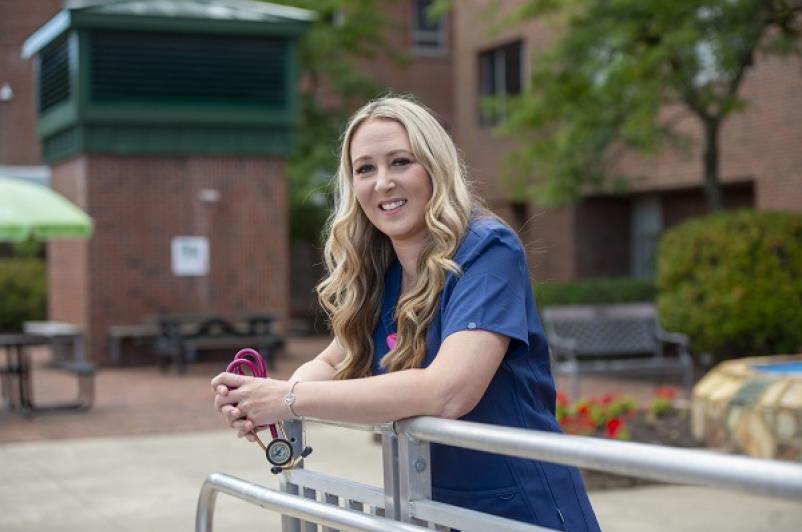
When Laura Cleary turned 40 last November, she was focused on two things: finishing her final semester of nursing school and taking the first step in her journey to motherhood through in vitro fertilization (IVF). Life, however, had other plans.
In early December, just before her final exams, Ms. Cleary had her second-ever mammogram. Her first had been the year before, prompted by her mother’s history with breast cancer. This time, the scan revealed something suspicious. Days later, a biopsy confirmed it: breast cancer.
“It was scary,” Ms. Cleary recalls. “I was about to start my last semester of nursing school. I had so many questions. What would treatment look like? Would I be able to finish school? And what about IVF? Everything was suddenly uncertain.”
Her first appointment at the UHS Breast Center set the tone for her care. She and her husband sat down with Michael Farrell, MD, breast surgeon, UHS Breast Center, who walked them through the diagnosis and the recommended treatment: a lumpectomy, followed by 26 rounds of radiation, and a five-year course of drug therapy.
“They explained everything clearly, gave me a folder to keep all my results and resources in one place, and answered every question. It made me feel like I had a plan and a whole team behind me,” Ms. Cleary says.
That team included medical and radiation oncologists, nurses, radiation therapists, front desk staff and a dedicated social worker, Sarah Richer, LMSW, who specializes in breast cancer patients.
Meeting the Patient's Needs
Ms. Richer first met Ms. Cleary shortly after diagnosis. As an oncology social worker at UHS, Ms. Richer’s role is to support patients through whatever their cancer journey looks like, even when it is as unique as Ms. Cleary’s. “Sometimes that means talking about big feelings, other times connecting them to resources or handling practical needs,” she explains.
For Ms. Cleary, support included all of this.
“Sarah was wonderful,” Ms. Cleary says. “She helped me apply for grants and UHS patient financial assistance and connected me with local programs like Sock Out Cancer. She took away a lot of anxiety about how we’d manage bills while I was in school and not working full-time.”
One of the most meaningful moments in Ms. Cleary’s treatment came when discussing drug therapy with her medical oncologist, James Lee, MD, PhD, UHS Medical Oncology. “Because I’m 40 with no children, starting IVF was incredibly important to me,” she says. “I was worried about how the medication would affect my hormones and fertility. Instead of brushing it off, he really listened and worked with me to create a plan that supported both my health and my dream of becoming a mom.”
Radiation therapy meant daily trips for several weeks, often squeezed in between nursing classes and clinical rotations. “Looking back, I don’t know how I did it,” she says. “There were days I was completely exhausted. But I had an incredible support system—my care team, my professors and my husband.”
The exceptional experience she had with her care team shaped the kind of nurse she wants to be. “Going through this has made me more empathetic and compassionate. I understand now what it’s like to be on the other side of the bed.”
Today, Ms. Cleary is thriving in the UHS Emergency Department Nurse Residency program, rotating through different hospital units before returning to the ED where she worked for nine years as a nursing assistant. She plans to begin IVF in the coming months.
She is grateful for the comprehensive, compassionate care she received at UHS—and for the people who made it possible: Dr. Farrell; Dr. Lee; radiation oncologist Arif Rashid, MD; the radiation team and her social worker, Ms. Richer. She also encourages everyone to speak with their doctor to determine the best time to get screened. “This can happen to anyone. You have to advocate for yourself and stay on top of your health,” she says.
The Importance of Early Detection
Laura Cleary’s case underscores the value of early screenings. Because her cancer was caught early, just one year after a clear mammogram, her prognosis was good, and treatment could be less invasive.
Oncology Social Worker Sarah Richer, LMSW, notes younger patients like Ms. Cleary are becoming more common, thanks in part to earlier and more frequent screenings. “It’s so important to talk to your primary care provider about family history, any changes you notice and when to start screening,” she says.
At UHS, oncology care is multidisciplinary, giving patients access to:
- Breast surgery and medical/radiation oncology with coordinated treatment plans
- Genetic counseling and testing to inform care and protect family members
- Nurse navigation for seamless appointment scheduling and care coordination
- Dedicated oncology social workers for emotional support, resource navigation and practical assistance
To learn more about breast health at UHS, click here.


